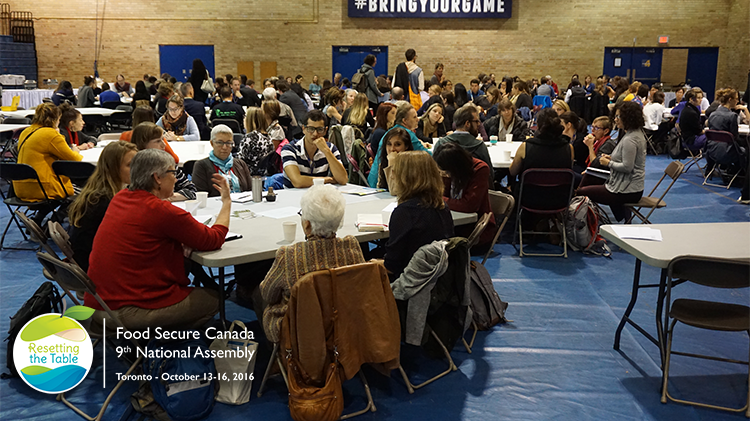Innovation Saturday at Resetting the Table - Highlights of the Day

Innovation, helpfully defined as “significant positive change” by opening speaker John Ikerd (Professor Emeritus, Missouri), was the theme of Saturday’s morning plenary. The first innovation he proposed was to make space for youth, women and Indigenous people.
Dr.John Ikerd speaking about the imperative to innovate on stage at #ResettingTheTable pic.twitter.com/uPLqrN0iRR
— Food Secure Canada (@FoodSecureCAN) October 15, 2016
He went on to wow the audience with a passionate call to change our failed industrial food system, which is not even delivering short-term food security for all, let alone long-term sustainability. He identified the mechanistic model of industrialised agriculture as being fundamentally in conflict with social and natural ecosystems. Community innovation, powered by love, was the leverage point he argued could change the system.

Bidakanne Sammamma (Deccan Development Society) and Jean-Martin Fortier (La Ferme des Quatre-Temps), farmers from Andhra Pradesh, India and Quebec respectively, proved John’s point with powerful presentations about their radical, organic and successful smallholdings. Bidakanne related some of the ways that she and her community innovated by saving, protecting and preserving seeds; teaching younger generations their heritage; and creating markets for neglected crops. She concluded that for her, “Innovation is marching forward to tradition."
Plenary Chair Lauren Baker (Global Alliance for the Future of Food) pointed out how Bidakanne’s approach moves towards both food and financial security, through strategies like growing multi-season varieties, eschewing expensive inputs and creating employment opportunities.
.@jm_fortier Jean-Martin Fortier (jardins de la Grelinette QC) sur la scène de #ResettingTheTable pour partager sa vision de l'innovation. pic.twitter.com/ejPZ1upEzI
— Food Secure Canada (@FoodSecureCAN) October 15, 2016
Jean-Martin, Quebec’s “rock-star” organic farmer, explained how he generates $100,000 per acre on his 10-acre micro-farm. By shunning tractors and using bio-intensive, multiple cropping on permanent beds, his family farm is providing full-time employment and a good living for four people. On a land base the size of a soccer field, his farm feeds 250 families with CSA baskets. His latest project, in partnership with a forward-thinking investor, is an 80-acre farm that incorporates livestock, greenhouses and four-season crops. Informed by very careful design, based on the principles of permaculture, it is an experiment that he hopes will become a blueprint for farms of the future.
Nancy Neamtan (Le chantier de l’économie sociale) is a life-long innovator and incubator in Quebec’s vibrant social economy sector, where food initiatives are blossoming. For her, innovation is learning by doing and is often born of necessity. To solve a problem, she said, you need to create the solution yourself and not wait for experts. Also, value social innovation as much as technical advances. Scale up for systemic change but recognise that multiplying can be as or more effective than getting bigger. Like John Ikerd, she looked to communities to change the system.
Debbie Field (FoodShare) took her inspiration from the women’s movement. Change, she said, comes from below; from the actions of the many. It is evolutionary. We cannot wait for the government to change the system or for any single innovation. She shared the main successes of FoodShare's including the “field to table” travelling food truck, the food bank garden and the good food box. Despite the upbeat and inspiring nature of the plenary, Debbie finished with two challenges: innovations are not always successful, and food banks, which first emerged as a response to excess food, are a mistake in terms of social justice. Finally, she said, global warming is an imperative to innovate.
The main message from today's plenary: "Bring on a localized food system!"
The open space session, Food Policy and Movement Building featured discussions as omnivorous and diverse as the food movement itself. Two hundred and sixty five delegates met around 21 tables to dig deep, network and make new friends. Organising around the national food policy, raising the profile of food issues, debating where food banks fit in the food security continuum, and supporting new farmers were just some of the issues debated around the "kitchen tables".
Open Space discussions at #ResettingTheTable. 235 participants discussing 21 food issues. pic.twitter.com/5e4ruTDAPU
— Food Secure Canada (@FoodSecureCAN) October 15, 2016
Check out this social media feed below to get a sense of the whole day, including the thirty sessions in the afternoon, which gave participants another chance to explore different aspects of the Assembly's ten streams:
- Log in to post comments


Comments
problem
Great job!!Vancouver Counseling
Its high time we should
Its high time we should change our attitude towards our industrial food system, and instead we should support our farmers to cultivate more food and help them to how to learn arabic get a better earnings through this. Thanks for sharing the highlights of this conference.